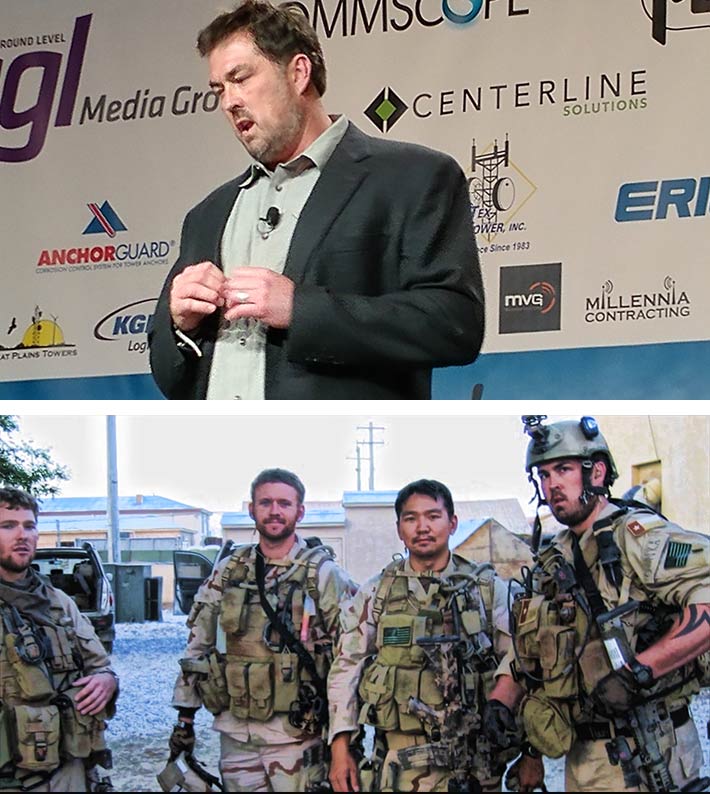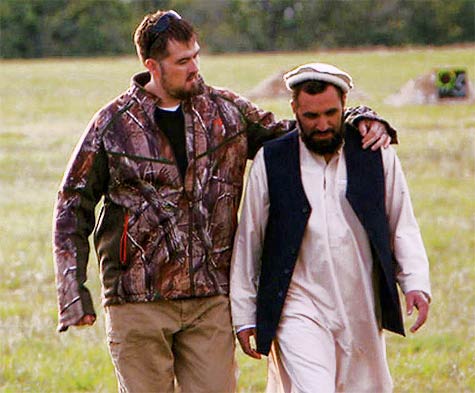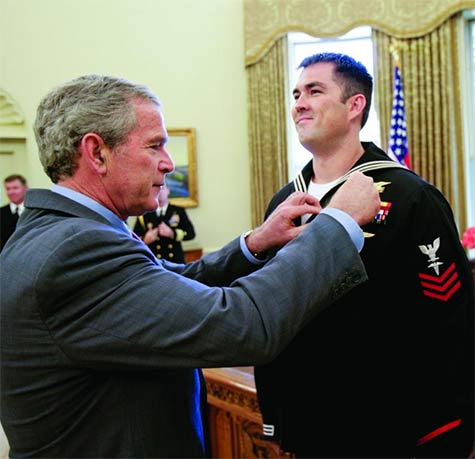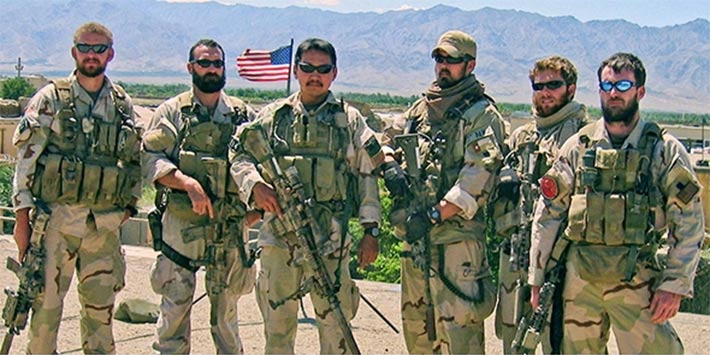
Navy SEAL Marcus Luttrell, at right, lost his three team members in a firefight in 2005. He relived that event and his rescue during a keynote session of the National Association of Tower Erectors sponsored by T-Mobile.
Decorated retired Navy SEAL Marcus Luttrell paced back and forth in front of almost 900 attendees at NATE UNITE 2017’s keynote address yesterday, effortlessly herding them from the Fort Worth, Tex. convention center to a Hindu Kush mountain top in Afghanistan in 2005 surrounded by Taliban fighters who killed Luttrell’s three team members.
But through his courage, training, and survival instincts – and after crawling seven miles to a Pashtun community where he was hidden by villagers who assisted in Luttrell’s escape as part of a traditional code of honor known as the Pashtunwali – he was rescued after another 16 Marine deaths.
Luttrell began his folksy and motivational conversation before National Association of Tower Erector attendees with enjoyable, and often darkly humorous stories of his dysfunctional and violence prone father, and how he began training for the SEALs at the age of 14, with U.S. Army veteran Billy Shelton, who lived near Luttrell’s home. Lutrell trained every day with his twin brother, Morgan, who also became a Navy SEAL, and others who aspired to join the U.S Navy and other special operations forces.
For the next 25 minutes the audience sat stone-still, almost like name-tagged mannequins, observing but shackled from helping Luttrell, as he relived the most compelling story of military heroism and human perseverance in present time.

Marcus Luttrell was later reunited with his rescuer, Mohammad Gulab. Luttrell added a little levity to his riveting NATE presentation, stating, “Normally I don’t shoot people in the back, but I was having a bad day.”
Luttrell said that his team was on a counter-insurgent mission, Operation Red Wings, to track Taliban leader Ahmad Shah who was responsible for killing over 20 U.S. Marines, as well as villagers and refugees who were aiding American forces.
Upon arriving at an area where Shah was reportedly living, the team was discovered by a shepherd and two goat herders. After much debate, Luttrell convinced his members that they would receive backlash if they killed the three herders. The team releases the herders, and as they attempted to abort the mission, they were ambushed by Taliban forces.
Although they killed a number of Taliban, Luttrell, a hospital corpsman and sniper, said they were heavily outnumbered and his three team members, team leader Michael P. “Murph” Murphy; sonar technician Matthew “Axe” Axelson; and communications specialist Danny Dietz, were killed.
Danny Dietz was firefight’s first casualty
“Danny died first,” Luttrell said.
“I was with him. Both his legs were broken and he was shot. I dragged him and then I had him on my shoulder and then I turned around, and then a bullet hit him in the head and killed him right then and there. I wasn’t ready for his dead weight. He collapsed over top of me and I started rolling.”
“My face went into the earth, I broke my nose and bit my tongue in half and swallowed it and I was suffering. I couldn’t breathe. I finally threw it up and then we got separated again,” Luttrell said, taking a moment to compose himself, recalling that he had been knocked out six times during the “gun fight” that lasted for hours.
“He started screaming for help. I couldn’t get up there”
Luttrell then painstakingly described Axelson’s death.
“He started screaming for help. I couldn’t get up there. He was shot in the back and shot in the face. When he started screaming my name I sat down, I put my weapon down over my legs and covered my ears. I couldn’t stand to hear him die.”
Luttrell then abruptly stopped his almost manic pacing in front of the audience for a moment of reflection, suggesting that maybe he could have done more to save him, a subject he has discussed in an interview with Anderson Cooper.

Luttrell served in Iraq and Afghanistan, and was awarded the Navy Cross for combat heroism in 2006 by President George W. Bush
However, Luttrell said at that point he was discovered by the Taliban, and one of the insurgents fired a rocket-propelled grenade, and its impact causes him to land at the bottom of a rock crevice where he was able to hide from the Taliban fighters.
“I buried myself in a shallow grave. I didn’t take a breath, a full breath. I was afraid,” he said, stating, “but as a Navy SEAL I was able to harness my fear.”
He then got up, he said, and had one magazine left for his rifle with 11 rounds in it. He missed twice shooting one insurgent, but hit him in the gut on his third shot.
“There were two more that came over the hill. I shot the two guys in the back and they fell. Normally I don’t shoot people in the back, but I was having a bad day,” said Luttrell.
With a cracking voice he continued telling how he was found after crawling seven miles with severe wounds and a broken back, and was hidden in a village while a quick reaction force team was deployed to rescue him.
Sixteen more servicemen die trying to rescue Luttrell
Luttrell said that he wasn’t aware of it at the time, but one of the two CH-47 Chinook rescue helicopters was shot down by the Taliban, killing eight Navy SEALs and eight Special Operations aviators who were on board; the second helicopter was able to escape.
To crawl the seven miles, Luttrell, who had been shot twice, had a broken back and shrapnel wounds in his legs, said he had to break it up in manageable steps by drawing a line in the dirt and crawl until he could look back to see his feet past the mark.
Desperate for water, he came upon a waterfall where, he said, several Afghan villagers confronted him. One of them, he said, was Mohammad Gulab, who convinced the others to save him.
While he was in their village the Taliban came to kill him and he was hidden from them by being shoved into a hole face down where he stayed for 27 hours.
Gulab, was able to send a mountain man to the nearest American air base to alert military forces of Luttrell’s location.
Helicopters were then sent in, and although there was a brief firefight, military teams were able to extract Luttrell to safety without any more fatalities.
New mission and new injuries end his career
After recovering from his injuries, he returned to active duty and deployed to Ramadi during Operation Iraqi Freedom in 2006, as part of SEAL Team Five. He later had his knees blown out and fractured his spine again, requiring him to be discharged.
Luttrell was awarded the Navy Cross for combat heroism in 2006 by President George W. Bush. Luttrell is also the author of the best-selling book, Lone Survivor, which detailed the horrific events that took place in Operation Red Wings.
In 2007, Texas Governor Rick Perry and his wife, Anita, helped Luttrell find a spine surgeon to fix his back and wean him from his addiction to painkillers. The two men developed a father-son-like bond that Luttrell never had growing up, and the Perrys nursed Luttrell back to health from his mental and health problems.
Luttrell has set up a trust with all proceeds from the book going to help families of deceased veterans and to donate to military charities.
In January 2014, Luttrell’s amazing story made the leap to the big screen with the blockbuster film, Lone Survivor, directed by Peter Berg and starring Mark Wahlberg as Luttrell.
“Wow! Marcus Luttrell’s impactful message was amazing and will be remembered for a long time by all of the conference attendees who were fortunate to be in the room,” stated NATE Trade Show Committee Chairman Joel Hightower of Hightower Communications, Inc. “It was an honor to welcome an authentic American hero like Marcus Luttrell to NATE UNITE 2017,” added Hightower.
During the luncheon, T-Mobile, who sponsored the event, unveiled a video highlighting the carrier’s Military Honors and Support Community initiative that embraces the hiring of military veterans in the workplace. T-Mobile has a strong national track record of hiring employees with military backgrounds to work in the wireless industry. Click HERE to view the video.

Navy SEALs Matthew G. Axelson (L to R), Daniel R. Healy, James Suh, Marcus Luttrell, Eric S. Patton, and Michael P. Murphy in Afghanistan. With the exception of Luttrell, all were killed June 28, 2005, by enemy forces while supporting Operation Red Wings.


















